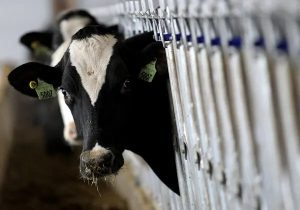
Idaho dairy cows produced less milk when exposed to wildfire smoke, a recently published University of Idaho study showed. Now, dairy farmers are concerned they could see a significant loss in the next two months, as more wildfires are anticipated to hit the West.
There’s been chatter among dairy farmers about the upcoming fire season and the anticipated poor air quality in July and August, said Rick Naerebout, CEO of the Idaho Dairymen’s Association. And there aren’t many viable ways to protect cows.
“Overall it does have a noticeable impact on the health of dairy cattle,” Naerebout told the Idaho Statesman by phone. “We’re kind of at the mercy of the air quality we receive. And it’s really tough to try and mitigate it.”
Valued at over $2.2 billion, milk is the biggest money maker for Idaho’s agricultural economy, according to the Idaho State Department of Agriculture. Last year, Idaho was the third-largest dairy-producing state in the country, right behind Wisconsin and California.
It’s too early to tell how much wildfires will cost Idaho’s dairy industry. With many variables that impact milk production, it’s hard to pinpoint decreases in the state’s overall milk production to smoke, Naerebout said.
But University of Idaho researchers hope they can help. The ultimate goal of researching wildfire smoke exposure on cows is to devise management strategies that dairy producers can use, said Amy Skibiel, assistant professor of lactation physiology at the University of Idaho and co-author of the study.
“This research really is so much in its infancy,” Skibiel told the Statesman.
MILK YIELD DROPS WITH SMOKE
From July through September 2020 — when fires burned throughout the Pacific Northwest — the researchers monitored a group of Holstein cows at the University of Idaho Dairy Center.
Wildfire smoke contains fine particulate matter, which is thought to be one of the most hazardous components of smoke, Skibiel said.
Fine particulate matter can cause health problems in humans, according to the U.S. Environmental Protection Agency.
The cows in the study, which lived in open air barns, were continuously exposed to wildfire smoke during a seven-day period in mid-September — when fine particulate matter was 10 to 23 times greater than the U.S. Environmental Protection Agency’s 24-hour average air quality limit.
During the seven-day period, milk yield dropped by roughly 2 1/2 to 3 pounds per cow for every 100 microgram per cubic meter increase in wildfire smoke particulate matter, Skibiel said. Some days, particulate matter crossed 200 and approached 300 micrograms per cubic meter, Skibiel added, meaning that cows lost about 7-8 pounds of milk production on those days.
Even after the smoke cleared, the cows produced less milk. It took another seven days of clean air for milk production to return to normal levels.
Skibiel said the effect of wildfire smoke fine particulate matter on milk yield was independent of other weather conditions, such as temperature and humidity.
How exactly does wildfire smoke impede milk production? Skibiel has a few preliminary guesses. Cows might not be eating enough, may have systemic inflammation, or undergo changes in metabolism.
Additionally, the researchers found changes in blood cell populations within the cattle, especially in certain types of immune cell populations, which could indicate an inflammatory response, Skibiel said.
These changes could potentially make a cow more vulnerable to a pathogen, like a bacteria, increasing susceptibility to disease or mortality. More research is needed to support any of these ideas, Skibiel added.
WHY COWS PRODUCE LESS MILK WITH SMOKE
Compared with other livestock, cows might have a tougher time during wildfire season.
One of the main problems in the beef cattle industry is bovine respiratory disease, said Juliana Ranches, assistant professor and beef extension specialist at Oregon State University.
In simple terms, cattle have more delicate lungs compared with other animals, Ranches said, and the beef industry spends a lot of money trying to treat bovine respiratory disease.
“I would imagine that being exposed to smoke would only make it more difficult to treat any other respiratory problems that an animal will have in the future,” Ranches told the Statesman.
Last year, Ranches’ research group conducted a survey with livestock producers, asking what they thought would happen, or what they saw happening, with animals after a smoke event. Producers mentioned dropping milk production, dropping weaning weight, and dropping dry matter intake — all of the performance measurements used for livestock, Ranches said.
“From the producer perspective, basically every single measurement, every single thing that will lead to profit, has been affected,” Ranches said.
Ranches and her colleagues received funding for a three-year study on the impact of wildfire smoke on beef and dairy cattle in Oregon. With a long-term study, she can look at the lingering effects of smoke exposure on cattle and the cattle industry.
They anticipate collecting data on smoke exposure effects later this summer, when fires are forecast to be in Oregon, Ranches said.
Like the University of Idaho researchers, Ranches’ group hopes to develop a plan to protect cows from wildfire smoke.
The first step is studying cows’ responses to smoke. Then, researchers can figure out what management strategies exist, Ranches said. Some possibilities could be nutritional supplements to improve water retention in cells, or purifying the air that comes into barns that house indoor cows, she added.
Trying to develop precautions that producers can use to protect their cows is a “million-dollar question,” Skibiel said.























